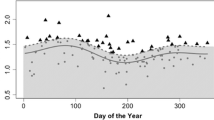Abstract
I conducted a longitudinal study of hormones and social behavior during pregnancy in 8 female pig-tailed macaques (Macaca nemestrina) living in a captive social group. Females exhibited reduced grooming activity after the first month of pregnancy and reduced aggressiveness in the last month. Female-male hindquarter presentations and male-female foot-clasp mounts decreased steadily during pregnancy. The week before parturition was associated with lower involvement in all social activities. Monthly changes in plasma concentrations of estradiol and progesterone are correlated with some changes in sexual behavior and grooming performed by pregnant females. Altogether, the findings suggest that pregnancy does not bring about a major disruption of female social relationships with other group members and that the influence of pregnancy hormones on female affiliative and agonistic behavior is less marked than that previously observed for infant-directed behavior.
Similar content being viewed by others
REFERENCES
Ardito, G. (1976). Check-list of the data on the gestation length of primates. J. Hum. Evol. 5: 213–222.
Chambers, K. C., and Phoenix, C. H. (1982). Decrease in sexual initiative and responsiveness in female rhesus macaques (Macaca mulatta) during pregnancy. Am. J. Primatol. 2: 301–306.
Erwin, J., and Anderson, B. (1975). Agonistic behavior of pregnant female monkeys (Macaca nemestrina): possible influences of fetal gonadal hormones. Psych. Rep. 36: 699–702.
Gibber, J. R. (1986). Infant-directed behavior of rhesus monkeys during their first pregnancy and parturition. Folia Primatol. 46: 118–124.
Hinde, R. A., and Proctor, L. P. (1977). Changes in the relationships of captive rhesus monkeys on giving birth. Behaviour 61: 304–321.
Maestripieri, D. (1994). Influence of infants on female social relationships in monkeys. Folia Primatol. 63: 192–202.
Maestripieri, D. (1996). Primate cognition and the bared-teeth display: a reevaluation of the concept of formal dominance. J. Comp. Psychol. 110: 402–405.
Maestripieri, D., and Wallen, K. (1995). Interest in infants varies with reproductive condition in group-living female pigtail macaques (Macaca nemestrina). Physiol. Behav. 57: 353–358.
Maestripieri, D., and Zehr, J. L. (1998). Maternal responsiveness increases during pregnancy and after estrogen treatment in macaques. Horm. Behav. 34: 223–230.
Martel, F. L., Nevison, C. M., Rayment, F. D. G., and Simpson, M. J. A. (1994). The social grooming of captive female rhesus monkeys: effects of the births of their infants. Int. J. Primatol. 15: 555–572.
Nieuwenhuijsen, K., de Neef, K. J., and Slob, A. K. (1986). Sexual behavior during ovarian cycles, pregnancy, and lactation in group-living stumptail macaques (Macaca arctoides). Hum. Reprod. 1: 159–169.
Nieuwenhuijsen, K., Slob, A. K., and De Neef, K. J. (1988). Fetal gender and aggression in pregnant stumptail monkeys. Dev. Psychobiol. 20: 277–282.
Sackett, G. P. (1981). Receiving severe aggression correlates with fetal gender in pregnant pigtailed monkeys. Dev. Psychobiol. 14: 267–272.
Silk, J. B. (1987). Correlates of agonistic and competitive interactions in pregnant baboons. Am. J. Primatol. 12: 479–498.
Wallen, K. (1990). Desire and ability: hormones and the regulation of female sexual behavior. Neurosci. Biobehav. Rev. 14: 233–241.
Wallen, K., and Tannenbaum, P. L. (1997). Hormonal mediation of sexual behavior and affiliation in rhesus monkeys. Ann. N. Y. Acad. Sci. 807: 185–202.
Wilson, M. E., Gordon, T. P., Rudman, C. G., and Tanner, J. M. (1988). Effects of natural versus artificial environment on the tempo of maturation in female rhesus monkeys. Endocrinology 123: 2653–2661.
Author information
Authors and Affiliations
Corresponding author
Rights and permissions
About this article
Cite this article
Maestripieri, D. Changes in Social Behavior and Their Hormonal Correlates during Pregnancy in Pig-tailed Macaques. International Journal of Primatology 20, 707–718 (1999). https://doi.org/10.1023/A:1020752702529
Issue Date:
DOI: https://doi.org/10.1023/A:1020752702529




